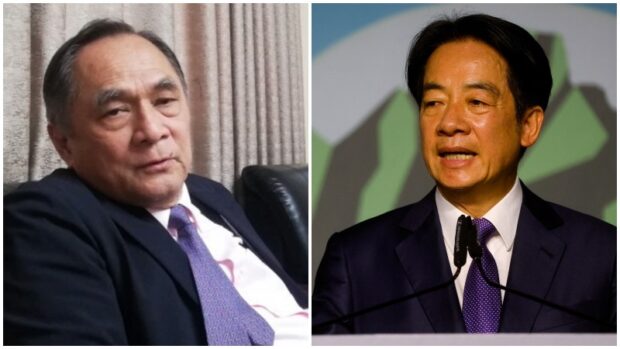
Philippine Ambassador to China Jaime FlorCruz (PNA FILE PHOTO) and Taiwanese President Lai Ching-te (REUTERS)
MANILA, Philippines — A congratulatory message by President Ferdinand Marcos Jr. to Taiwan’s President-elect Lai Ching-te has sparked a fierce backlash from China, as Beijing summoned the ambassador from Manila on Tuesday and warned the country “not to play with fire.”
“The relevant remarks of President Marcos constitute a serious violation of the One China principle and … a serious breach of the political commitments made by the Philippines to the Chinese side, and a gross interference in China’s internal affairs,” a Chinese foreign ministry spokesperson said at a regular press conference on Tuesday.
China was “strongly dissatisfied with and resolutely opposes these remarks,” spokesperson Mao Ning said, referring to Mr. Marcos congratulating Lai on Monday for winning Taiwan’s election and referring to him as its next president.“
“China has lodged a strong protest with the Philippines at the earliest opportunity,” and summoned Philippine Ambassador Jaime FlorCruz “to give China a responsible explanation,” Mao said, adding: “We suggest that President Marcos read more books to properly understand the ins and outs of the Taiwan issue, so as to draw the right conclusions.”
There was no immediate comment from the Department of Foreign Affairs (DFA) on Beijing’s move.
Under the “One China” policy, the Philippines recognizes the People’s Republic of China as the “sole legal government of China,” with Taiwan as “an integral part of Chinese territory.”
The policy was laid down in a communique signed by then President Ferdinand Marcos Sr., the President’s late father and namesake, on behalf of the Philippine government on June 9, 1975.
In a post on X (formerly Twitter) on Monday night, the President congratulated Lai on his electoral victory.
“On behalf of the Filipino people, I congratulate President-elect Lai Ching-te on his election as Taiwan’s next President,” Mr. Marcos said.
The President added: “We look forward to close collaboration, strengthening mutual interests, fostering peace, and ensuring prosperity for our peoples in the years ahead.”
On Tuesday morning, the DFA clarified that there was no change in the Philippines’ position on Taiwan.
“The Philippines and Taiwan share mutual interests which include the welfare of nearly 200,000 OFWs (overseas Filipino workers) in Taiwan,” it said.
“The message of President Marcos congratulating the new president was his way of thanking them for hosting our OFWs and holding a successful democratic process,” it added.
“Nevertheless, the Philippines reaffirms its One China Policy,” the DFA stressed.
Asked for comment, Presidential Communications Secretary Cheloy Velicaria-Garafil said: “Please refer to the DFA statement released early today (Tuesday).”
In a statement released on Sunday, the DFA reaffirmed the principles in the 1975 joint communique between the Philippines and China, which established diplomatic relations between the two nations.
“The Philippines is committed to its One China Policy,” said the DFA, noting that under the communique, “the two governments agree to settle all disputes by peaceful means… without resorting to the use or threat of force.”
Marcos’ tweet came following the election of Lai, 64, who won 40 percent of the votes in a three-way race with rivals from the Kuomintang and Taiwan People’s Party.
Lai’s victory allowed the governing Democratic Progressive Party to remain in control for another term.
His victory came despite China’s efforts to warn voters against the Democratic Progressive Party. China has consistently claimed Taiwan as part of its territory despite its self-governance.
Unofficial relations
Although the Philippines does not recognize Taiwan diplomatically, the two engage in unofficial relations through the Taipei Economic and Cultural Office in Manila and the Manila Economic and Cultural Office in Taipei.
Taiwan, China, and the Philippines are among the claimants of the vast South China Sea, parts of which Manila refers to as the West Philippine Sea, or the waters within its 370-kilometer exclusive economic zone (EEZ).
In 2016, an arbitral tribunal in The Hague, the Netherlands, voided China’s sweeping claims that cut into the EEZ of other claimant countries in the sea and recognized the Philippines’ sovereign rights to fish and explore resources within its waters.
Beijing does not recognize the ruling.
Also on Tuesday, the Liberal Party (LP), considered the country’s top opposition party, also congratulated Lai and Vice President-elect Bi-khim Hsiao on their landslide victory in the Jan. 15 presidential election.
‘Vibrant, independent future’
In a statement, the party’s chair, former Sen. Francis Pangilinan, praised the Taiwanese people for their “unwavering commitment to democracy, freedom, and the pursuit of a vibrant, independent future.”
“President-elect Lai’s triumph is a testament to his steadfast dedication to public service, his strong leadership, and his unyielding commitment to the values we hold dear — values of democracy, human rights, and the rule of law,” Pangilinan said.
“Vice President-elect Bi-khim’s distinguished background as a successful diplomat and legislator, known for her championing of liberal democracy, further enhances the dynamic leadership that Taiwan will experience in the coming years,” he added.
Pangilinan also expressed his admiration for Taiwan’s “democratic journey” and his solidarity with the self-governing island.
“In the Philippines, we have long admired the democratic journey of our Taiwanese friends. We share a common history of the struggle for freedom and a deep appreciation for the precious gift of democracy. As fellow Asian nations, we are bound by shared values and a collective desire for a peaceful and prosperous region,” he said.
He expressed his confidence that Taiwan will continue to be a “beacon of democracy and a thriving economic powerhouse” under the new administration.
LP, which has 10 seats in the House of Representatives, is a member of the Council of Asian Liberals and Democrats, a regional network of democratic parties in Asia.

